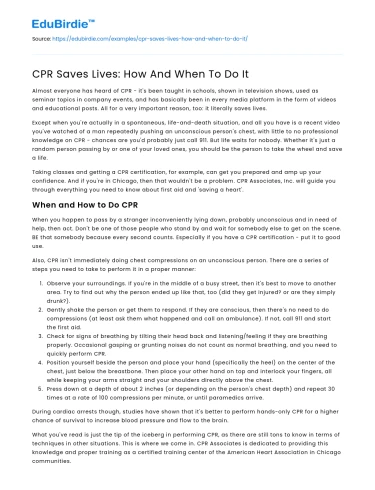Almost everyone has heard of CPR - it's been taught in schools, shown in television shows, used as seminar topics in company events, and has basically been in every media platform in the form of videos and educational posts. All for a very important reason, too: it literally saves lives.
Except when you're actually in a spontaneous, life-and-death situation, and all you have is a recent video you've watched of a man repeatedly pushing an unconscious person's chest, with little to no professional knowledge on CPR - chances are you'd probably just call 911. But life waits for nobody. Whether it's just a random person passing by or one of your loved ones, you should be the person to take the wheel and save a life.
Save your time!
We can take care of your essay
- Proper editing and formatting
- Free revision, title page, and bibliography
- Flexible prices and money-back guarantee
Taking classes and getting a CPR certification, for example, can get you prepared and amp up your confidence. And if you're in Chicago, then that wouldn't be a problem. CPR Associates, Inc. will guide you through everything you need to know about first aid and 'saving a heart'.
When and How to Do CPR
When you happen to pass by a stranger inconveniently lying down, probably unconscious and in need of help, then act. Don't be one of those people who stand by and wait for somebody else to get on the scene. BE that somebody because every second counts. Especially if you have a CPR certification - put it to good use.
Also, CPR isn't immediately doing chest compressions on an unconscious person. There are a series of steps you need to take to perform it in a proper manner:
- Observe your surroundings. If you're in the middle of a busy street, then it's best to move to another area. Try to find out why the person ended up like that, too (did they get injured? or are they simply drunk?).
- Gently shake the person or get them to respond. If they are conscious, then there's no need to do compressions (at least ask them what happened and call an ambulance). If not, call 911 and start the first aid.
- Check for signs of breathing by tilting their head back and listening/feeling if they are breathing properly. Occasional gasping or grunting noises do not count as normal breathing, and you need to quickly perform CPR.
- Position yourself beside the person and place your hand (specifically the heel) on the center of the chest, just below the breastbone. Then place your other hand on top and interlock your fingers, all while keeping your arms straight and your shoulders directly above the chest.
- Press down at a depth of about 2 inches (or depending on the person's chest depth) and repeat 30 times at a rate of 100 compressions per minute, or until paramedics arrive.
During cardiac arrests though, studies have shown that it's better to perform hands-only CPR for a higher chance of survival to increase blood pressure and flow to the brain.
What you've read is just the tip of the iceberg in performing CPR, as there are still tons to know in terms of techniques in other situations. This is where we come in. CPR Associates is dedicated to providing this knowledge and proper training as a certified training center of the American Heart Association in Chicago communities. We offer CPR training, certification, and even online classes to ensure that our trainees are well-equipped to handle emergency situations not just in Chicago, but in everywhere they travel.
Dedicated to having quality and advanced education and skills, we aim to be not only a renowned and trusted center for health education, but to also spread awareness on how important knowing CPR is and to, essentially, save more people's lives.






 Stuck on your essay?
Stuck on your essay?

